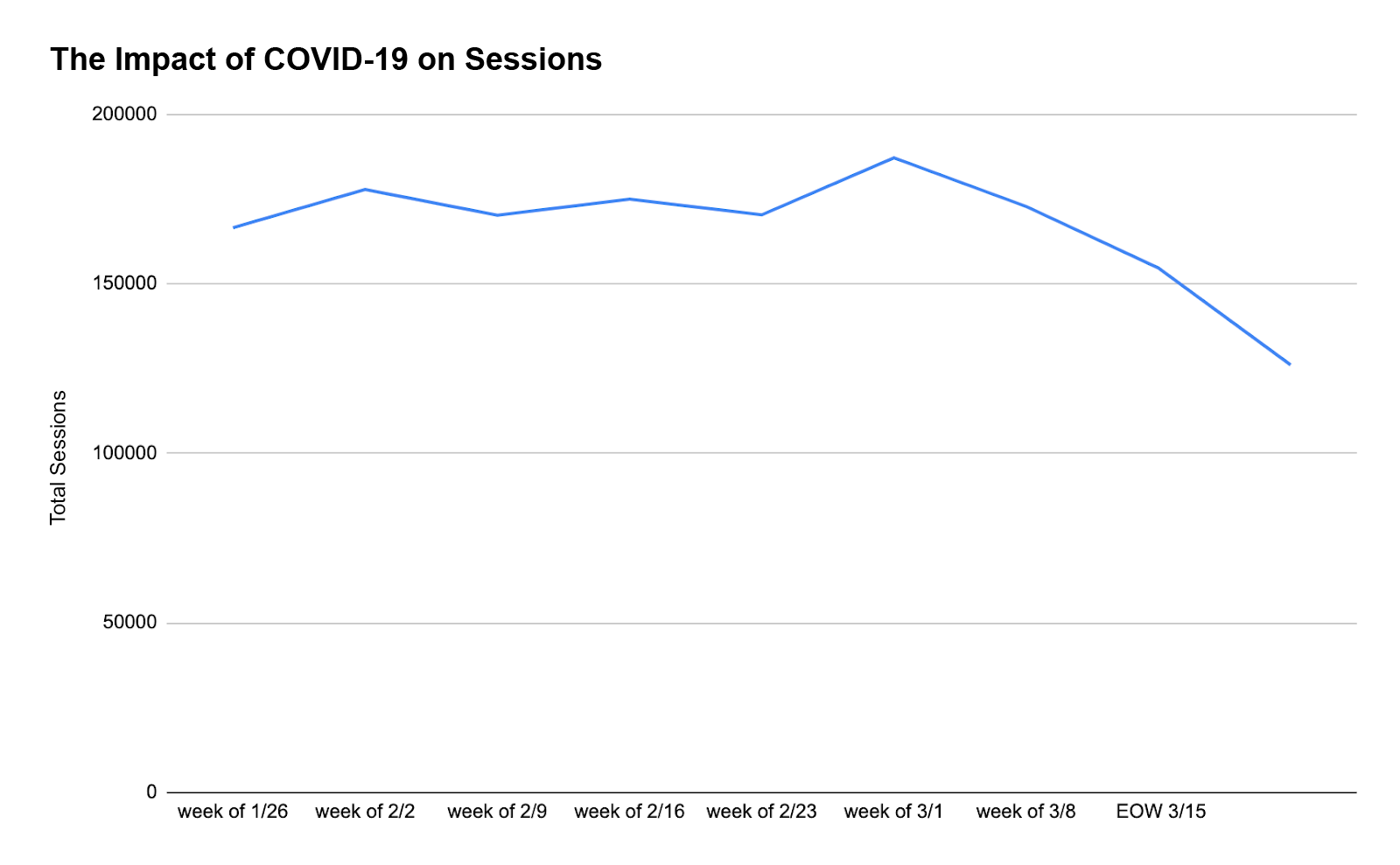While the ultimate impact of the COVID-19 crisis remains unknown, its effect on the digital marketing world is already unprecedented. Marketers and sales leaders are rightfully concerned, but we are also weathering the situation by doing what we do best: adapting, evolving and working creatively to deliver value and support to our audiences.
In that spirit, New Breed has pulled data and insights from across our space to help marketers mitigate the impact of this pandemic and hopefully set themselves up for a successful recovery.
Search Traffic is Down, and Marketers Should Prepare for Revenue Impact
There’s no easy way to say it: Search traffic and associated conversions are way down. B2B decision-makers are turning their focus inward to business-critical functions, and the resulting search decline is a leading indicator of decreased revenue, at least in the short term.
Since March 11, 2020, organic traffic has dipped by 18% on average, according to our research. New contacts from search and paid traffic are also down by 12% on average. While we continue to watch the trends closely, the numbers are unnerving, and marketers are wise to brief their stakeholders now on potential long-term business impacts. Depending on your sales cycle length, decreased leads today could result in reduced revenue 60–90 days down the line.

Making Adjustments Now Can Result in Long-Term Dividends
Despite the widespread search traffic drops we are observing, marketers do have options. The essence of inbound marketing and sales is to add value, and crisis points offer opportunities to do just that.
Recent reports suggest digital engagement is surging, and marketers are responding. While every business is different, we typically recommend strategies that emphasize empathy, connection and support through this uncertain time and a focus on optimizing budget efficiency. Finally, personalization and messaging relevance have never been more important. Here are a handful of approaches to support those objectives:
- Customer marketing: Customer marketing is always important, and even more so when your audiences are anxious or forced to change their behavior. Consider new campaigns to reassure clients on how your solutions can help them. Have you recently activated a new feature that may be especially relevant now? Share this with your clients in a consultative way that acknowledges the situation at hand.
- Branding: Just because search activity is declining doesn’t mean your brand is irrelevant. Stay active on social to engage your community, empathize with your audience and offer proof of your value where appropriate. Ensure your website product and solution pages are optimized. Above all, seek opportunities to continue telling your brand’s story in a consultative way. Your audience will be reassured to know that the companies and solutions they trust are still active.
- Website UX and conversion optimization: A high-performing website is business-critical, now more than ever. Consider updating your web content strategy to highlight the ways your business is adapting and helping your clients through COVID-19, and make user experience design updates to better engage your traffic. With overall traffic declining, you’ll want to ensure you are delivering an exceptional experience to the visitors who do arrive on your site.
- Paid search and social optimization: While it’s not a great time to distract your audience with irrelevant offers and static brand campaigns that make you appear tone-deaf, data indicates that paid campaigns can still be effective. Similarly, social media remains a preferred source of information during this moment of “social distance.” Evaluate your paid and social campaigns and consider shifting budget from traditional and offline media to this highly efficient channel.
- Foundational website and search improvements: The COVID-19 pandemic will eventually subside, and you will want to be ready. Prepare for an economic rebound by revamping evergreen content and optimizing your website for conversion among the traffic you are retaining.
- Personalization and database activation: It’s more important than ever to have authentic, personal and relevant messaging. Pay closer attention to your database “hygiene” and create audience-specific nurture campaigns and ads so that your messaging is as relevant as possible.
- Inbound sales support and communications support: Many markets changed virtually overnight as a result of COVID-19, and frontline sales and support staff have had to pivot. Provide them with new, consultative messaging to acknowledge the situation and offer helpful advice, brief them on your latest marketing campaigns and listen to what they’re hearing in the field. What you learn can in turn be applied to your marketing through targeted outreach, blog posts and social content to help your overall brand stay aligned on messaging.
- Reporting: In a rapidly evolving market, quality data and reporting will take on even greater importance. Now is an advantageous time to audit your data and build the marketing and sales attribution reports you need to increase efficiency going forward.
The Takeaway
COVID-19 is unlike any event in recent memory. Early trends suggest a profound impact on the digital marketing landscape. That said, the widespread nature of the crisis also creates new opportunities to create lasting connections to your audience, and fortifying your digital marketing strategy now may pay dividends over the longer run. We are all in this together, and together, we will evolve, adapt and bounce back.
Al Moore
Al is the Director of Marketing for New Breed. He has spent the last 15+ years as a B2B and SaaS marketer, and he is passionate about helping companies leverage the digital space to reach and engage their audiences effectively and efficiently.





